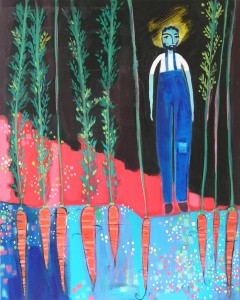It’s almost 2012. If the Mayans are correct and everything goes bottoms up this year, then it’s a good thing I’ve spent 2011 tooling up on my practical skills.
There are a few essentials to surviving an apocalypse (if it’s the kind of apocalypse that can be survived, of course, and not the kind whereby the Earth implodes or everyone’s buried helplessly in volcanic ash, a la Pompeii). Having a farm that produces food is definitely on the top 10 list of apocalypse survival best practices.
Knowing what to do with that food (e.g. whole grains, dried beans) to make it palatable and to feed your family through the winter is another secret to survival. (Re)learning how to cook with whole foods has been a major challenge for us since we started our farm in 2007/2008. I still remember finishing a day of hard work and being so hungry, but feeling like there wasn’t anything to eat in the house because we didn’t have nacho chips and sour cream. We’ve come a long way, baby, and now have a comprehensive repertoire of whole-food recipes in our toolkit.

A small selection of Makaria Farm's library.
A third necessity for post-apocalypse living is a respectable library. How else will you spend your time, once the internet no longer exists? How else will you learn how to save seeds or build a hand-crank well-pump, if you haven’t bothered to learn those skills pre-apocalypse? And how will culture survive (you know, culture — that thing that separates us from animals) if there aren’t any copies of Hamlet left after the tsunami waves recede?
After we downsized from a two-bedroom urban apartment to our bachelor-suite-esque home on the farm 4.5 years ago, most of our extensive book collection was relegated to liquor store boxes in various sheds. Between Brock and me we have pretty much every good book ever written in the English language. For example: a few months ago I read Virginia Woolf’s A Room of One’s Own and wanted to read more. I hunted through our boxes and found everything she’d ever published — even a few duplicate copies.
This holiday season we’d had enough of scrounging through boxes. We reorganized our various sheds and dedicated one solely to our books. Now, everything is displayed so we can stand surrounded by titles, sorted by theme or author, and delight in our collection.
Finally, in a post-apocalyptic society (and in a pre-apocalyptic society, for that matter), community is essential. To that end, we felt it was high time that we started a farm blog. After 4.5 years as vegetable farmers we’ve learned how to make pumpkin pie from scratch and how to grow our own wheat. We’ve suffered through raven attacks on our transplants, wire worms in the potato patch and unseasonal frosts. We’ve also won awards and grown carrots that inspired art. It’s comforting to have others share our pain, and celebrate our triumphs. This is our first blog post, and we hope it won’t be our last, despite the hectic growing season.
So, to re-cap our apocalypse survival strategy:
- farm
- know how to cook
- stockpile books
- connect
With preparations made, we can now settle down and await 2012 with confidence.

